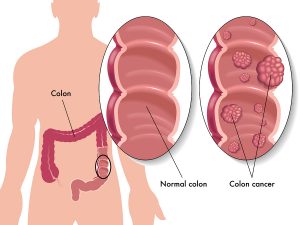A new study showed that fiber intake improves survival rates of colorectal cancer. JAMA Oncology published it on Jan. 18, 2018 online.
121,000 people were part of the study. First of all, this group consisted of males from the Health Professionals Follow-up Study. In addition there were also females from the Nurses’ Health Study. While the follow-up of the participants continued for 25 years, the researchers identified mortality data and colon cancer cases. Consequently they determined that 2,699 cases of colorectal cancer occurred during the follow-up. Every 4 years there were detailed food questionnaires for each of the participants.
Results of the study
1. First of all, when participants ate a high inflammation score diet, there was a higher risk of developing either colon cancer or rectal cancer. Furthermore, participants who ate the most inflammatory foods developed 37% more colon cancer and 70% more rectal cancer than did controls.
2. As a result the investigators concluded that there are two kinds of foods. They termed them inflammatory and non-inflammatory foods.
A. Here are the inflammatory foods causing colorectal cancer: Red meat, processed meat, organ meat, refined flour and sugary drinks. It seems like this is part of the Standard American diet.
B. Inflammation-reducing foods are: green leafy vegetables, whole grains, dark yellow vegetables (yams, carrots, squash, yellow peppers), fruit juice and coffee. This would probably be more like a Mediterranean-like diet. Most of all, there were a few people who had the greatest anti-inflammatory effect from their diet. In addition they refrained from alcohol and most of all, they ate the anti-inflammatory vegetables.
Statistics showing that fiber intake improves survival rates of colorectal cancer
What were the statistics in terms of the participants of the study? 1575 participants (963 were women) had developed stage 1 to 3 colorectal cancers. The follow-up of them continued over 8 years. There were 773 deaths. It seems like the high-fiber intake led to lower mortality of these colorectal cancer patients. Most of all, the investigators found that each additional 5 grams of fiber per day reduced colorectal cancer mortality by 22%. In addition, they could even measure the preventative effects on colorectal cancer. They did this by measuring the reduction of the mortality of new colorectal cancer cases due to various fiber sources.
- Cereal fiber: reduced mortality by 33% (per 5 grams/day)
- Vegetable fiber lowered mortality only by 18% (per 5 grams/day)
- Whole grain showed a 28% reduction (per 20 grams/day)
Conclusion
Most noteworthy is the fact that this study showed two effects. First of all, it demonstrated that a person eating an anti-inflammatory diet did not develop colorectal cancer easily. It is especially relevant that this anti-inflammatory diet contained vegetables, whole grains, fruit juice and coffee. Furthermore, people came down with non-metastatic colorectal cancer. It seems that the consumption of fiber could still reduce mortality of this group significantly. This was most noteworthy for cereal fiber. As a result, the more fiber they added, the better the long-term survival chances were. In conclusion, it does matter what food you eat, if you want to avoid getting cancer. Finally, if you were ever diagnosed with colorectal cancer, probably the more fiber you eat, the better your survival chances will be.







